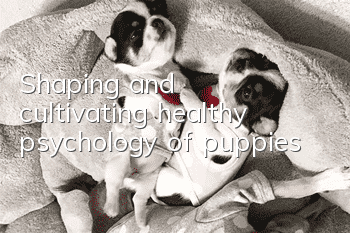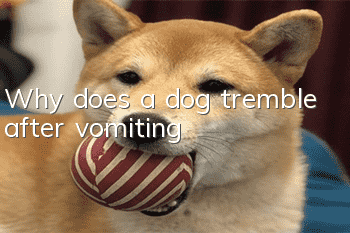Shaping and cultivating healthy psychology of puppies

The puppy period is an important period for the development of the dog's psychological and physiological functions. During this period, an environment conducive to the physical and mental development of the puppy is created, the puppy's psychology is shaped in a targeted manner, and certain qualities are cultivated for the puppy. A favorable guarantee for growing into a qualified working dog.
1. Create a healthy psychology
The psychological development of puppies is closely related to the environment. When puppies meet their basic survival needs or after that, they interact with the external environment. During this period, puppies have little effect on the outside world. They are mainly affected by various information from the outside world. Therefore, control has no effect on the outside world. The living environment in which a dog acts will affect the dog's understanding of the outside world. To shape a dog's perfect psychology, we can start from the following aspects:
(1) Meeting the puppy’s safety needs is the basis for the puppy’s mental health. "Benefits and harms are the puppies' only understanding of the outside world." In the process of maintaining survival, the puppy's body has a very prominent characteristic of "seeking advantages and avoiding disadvantages". For dogs that are two to one to six weeks old, their sensory organs have gradually matured, and the "imprinting" learning method is playing a greater role. During this period, it is easy to form a stable and difficult-to-change memory in response to noxious external stimuli. Therefore, during this period, a safe environment should be created so that the puppies will not be inadvertently exposed to sudden stimulation. The puppy nursery should establish a good relationship with both the mother dog and the puppies. The important "environment" and the resulting "safe" residence create favorable conditions for the puppies to separate from the mother dog, making the puppies confident in their growth. Many cases have been analyzed that the timidity and nervousness of adult dogs are often related to the noxious stimulation received by puppies. When it comes to puppies, safety is everything.
(2) The group relationship of puppies is an important step in the psychological growth of dogs, which can promote the further development of the senses and increase the ability to communicate information. The dog's habit of living in groups is the foundation laid in the early stages of life, while the habits of adult dogs when getting along have more traces of getting along with each other as puppies. For dogs before five weeks of age, because their functional differences are small and their activities are very similar, it is difficult for dogs to harm each other when communicating with each other. Moreover, the biting, chasing and other behaviors during this period are exercises for the dog's hunting instinct, so during this period, Providing a venue for dogs to stimulate communication, such as lawns, etc., can promote the dog's judgment of space and enhance the physical strength of puppies; changing the venue for puppies' activities can also provide more opportunities for dogs to play.
(3) The guidance of the dog’s individual consciousness is the key to the dog’s psychological growth. Entering the physical growth period of 6 to 19 weeks, as the differences in the body appear and intensify, the dog's activities will have a strong "self-awareness". This awareness is caused by and characterized by fights over food. The evolution and intensification of the dog's individual consciousness has led to the puppy's further understanding of itself and the development of behaviors based on conditioned reflex activities, such as not daring to eat when food appears, not daring to take possession of items picked up, etc. At this time, the dogs should be raised separately. It is important to grasp this opportunity. The puppies should be selected when this behavior has occurred for a period of time but does not cause serious psychological pressure on the puppies. This is a way to help build your self-confidence. when separated,Puppies should be allowed to maintain visual contact first. to maintain its need for the group. Isolated training in space is the beginning of developing the personality of disadvantaged dogs and making them possess the temperament of dominant dogs. At this time, the dog's feeding is used as the basis to make the dog's body energetic. Set up separate fences and opportunities for interaction with other dogs that bark and intimidate. In collective feeding that is not well managed, the differences between superior and inferior dogs will intensify, causing inferior dogs to become neurotic and lack self-confidence. In contrast, dogs with particularly weak types or neurotic traits are rarely found among domestic dogs, which may have a lot to do with timely separation.
(4) The play behavior of puppies is a reflection of the dog’s psychological characteristics. Puppies play significantly more with each other than with adult dogs. Dog play behavior changes as puppies grow. It is also the enlightenment stage for cultivating certain work abilities. There are two necessary conditions for this behavior to occur: first, there is inner pleasant emotion, and second, there is excess energy. Therefore, creating an environment for dogs to complete their play behaviors, trainers playing with dogs, and providing dogs with game items such as balls, linen, wooden blocks and other toys are also catalysts for the development of play behaviors and healthy psychology. Once dogs are in obvious fights during play, they should be stopped artificially. For those dogs that are not good at playing games, you can use time such as morning and evening to create opportunities when the puppies are excited, and use their excitement to let the dogs discover the fun of games by themselves. Through game activities, the dog's mobility and confidence are enhanced, which is very beneficial for it to become a working dog.
2. Cultivation of physiological qualities of puppies
It is based on the dog's basic mobility. Certain qualities are also necessary for a working dog. For police working dogs, the training of puppies should focus on the following aspects.
(1) Dog’s physical strength. The dog's physical strength is the basis of the dog's mobility and endurance. The development of physical strength should begin once the puppy is able to engage in physical activity. The younger the dog is, the more the training of the dog's physical strength should be integrated into the dog's independent activities, so that the puppy can control the amount of activity by itself. As the dog grows, further plans should be made to take the dog for longer walks, but the times should not be too many. Furthermore, on this basis, training and exercises to increase the flexibility of the dog's body, such as climbing and descending obstacles, walking on narrow bridges, turning and running, etc., can improve physical strength while cultivating physical flexibility.
(2) Dog courage. There is an important period for developing a dog's courage, that is, when the dog is five to seven months old. The cultivation of dog courage includes the puppy's adaptation to the environment and the enhancement of the dog's courage toward people. Dogs become increasingly sensitive to the environment and their courage tends to become smaller. In this process, the dog should be played with the dog so that the dog can produce simultaneous negative induction during the excitement time and ignore the existence of strange things. At this time, do not force the dog to complete activities such as going up stairs, but guide the dog to complete it excitedly to avoid passive reactions in the puppy. Engage in conscious fire and sound exercises. Adapt to people. After the dog can bark, encourage the dog to bark. The trainer cannot use strong mechanical stimulation and avoid other people's shouting and other sound stimulation.
(3) Title-taking ability. Picking up things is workOne of the necessary abilities for a dog. The dog's biting ability is transformed from the hunting instinct. There are roughly two ways to train a dog to pick up: It is very important to develop a dog's picking ability at an appropriate stage of the dog's development. Even before the age of two months, puppies will start chasing and picking up objects. At this time, using tree branches, tennis balls, etc. to lure the dog, and playing games with the dog will make it easier to develop the dog's picking ability; when the dog reaches seven After a month, the body tends to mature. At this time, if the dog has not developed the ability to pick up, it can be beneficial to the dog's ferocity. If the dog has strong hatred towards people, you can use sackcloth or wooden sticks to provoke the dog and stimulate it. The dog's malicious biting turns its hostility toward the object. The key point is to enhance the dog's confidence in possessing and picking up the object.
(4) Correct the bad habits of puppies. In the breeding and management of puppies, puppies are affected by many factors and may develop bad habits, such as chasing poultry, attacking people, playing in sewage, etc. Because the dog's nervous system is not yet fully developed and cannot withstand strong stimulation, a preventive strategy should be adopted for puppies and the dog should not be given a chance to show off. Once a prohibited behavior occurs, the trainer only needs to simply pull it away to stop it, and should give less mechanical or verbal stimulation to allow the bad habit to disappear naturally.
The psychological and physiological cultivation of puppies runs through the process of raising and managing puppies. In this process, the trainer must know more about the development characteristics of the dog, adapt to the dog's conditions, and patiently and meticulously provide correct guidance to the dog, in order to cultivate a working dog that meets the training needs.
- How to avoid getting your dog pregnant
- What to do if your Bichon Frize keeps having diarrhea? How to treat your Bichon Frize to have diarrhea!
- Causes, Symptoms and Treatment of Difficult Labor in Dogs
- What can’t Tibetan Mastiffs eat?
- How to train a dog to fetch a ball. Commands and rewards are both crucial.
- What should I do if one of my dog’s nails turns black?
- Oral diseases commonly suffered by dogs
- How to express anal glands in dogs
- How many months does a male Labrador mature?
- Only by understanding your dog’s habits can you raise a good dog!



